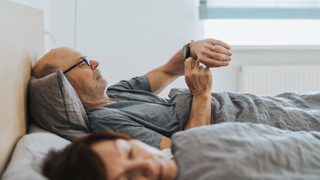We all know how disrupted sleep can adversely affect our mental health and energy levels, but it can severely impact our physical health, too. And researchers have now linked poor sleep to fatty liver disease.
According to the study, metabolic dysfunction-associated steatotic liver disease (MASLD)— a condition where fat builds up in a person’s liver, can lead to poor sleep quality. This includes difficulty in falling asleep, staying asleep for longer and overall low sleep efficiency.
Key Takeaways
- Approximately 25% of the world population is affected by MASLD and the numbers are set to rise up to 55% by 2040
- Patients with a fatty liver were observed to struggle with daytime drowsiness
- Patients woke up 55% more often compared to healthy individuals
The study using data from clinical trials was conducted by researchers at University of Basel’s Centre for Gastrointestinal and Liver Diseases in Switzerland. Though there have been previous studies about how a person’s circadian rhythm is affected by MASLD, the majority have been based on sleep questionnaires alone.
However, with this recent study from Switzerland, sleep data was collected from two groups of people: 46 adult women and men with biopsy-proven MASLD or liver cirrhosis and a control group of 16 healthy individuals. This excluded those below 18 years of age, pregnant or lactating mothers, shift workers and individuals suspected to have obstructive sleep apnea and other physical and psychiatric disorders.
All participants were asked to wear ActTrust, a wrist-worn device which collects sleep data by monitoring activity, light and wrist temperature, everyday (24 hours except while taking a shower and during sports sessions) until the end of the study.
This research shines a light on how underlying health conditions can have an impact on your sleep and thereby your overall wellbeing. Let’s look further into how this study was conducted.

Poor sleep quality and daytime sleepiness among patients
The data recorded by the device was analyzed using ActStudio software which calculated parameters like bedtime, wake-up time, total sleep duration, sleep onset latency—time taken to fall asleep, percentage of sleep efficiency and number of awakenings.
It was found that while both groups slept the same amount of time, patients with the fatty liver condition woke up 55% more often than the control group and lay awake 113% longer, waiting to fall back into sleep. “Those with fatty liver disease demonstrated significant fragmentation of their nightly sleep due to frequent awakenings and increased wakefulness,” said Sofia Schaeffer, the postdoctoral researcher who led the study.
It was also noted that sleep disturbances due to psychological stress were reported more by MASLD patients (32%) compared to healthy individuals (6.25%) and those with liver cirrhosis (9%). To create better awareness about following healthy sleep habits, MASLD patients attended a sleep hygiene education (SHE) session midway through the study. This, however, did not seem to change their poor sleep patterns until the end of the research.

“The underlying mechanism presumably involves genetics, environmental factors and the activation of immune responses -- ultimately driven by obesity and metabolic syndrome,” added Schaeffer.
While this could be a first-of-its kind clinical study aiming to find links between sleep disruption and fatty liver diseases, researchers are still unsure about whether MASLD actually causes insomnia or vice versa.
“Future studies should explore perpetual sleep counseling sessions or interventions such as light therapy in combination with other lifestyle changes to improve the sleep-wake cycle in patients with MASLD," explained Dr Christine Bernsmeier, a senior researcher and professor at the University of Basel.
How to get better sleep to improve liver function
While a single SHE session is unlikely to change your sleep patterns overnight, following good sleep hygiene practices is essential to help your body and mind get the required rest they need, which can improve your overall health with time. Here are three ways you can achieve that:
Establish a regular sleep schedule
Studies show that going to bed and waking up at the same time everyday can help regulate your circadian rhythm— your body's sleep cycle. This is a not an easy task with today's fast paced lifestyle and you may hit roadblocks like a project deadline which is why it's important you know how to reset your sleep schedule.
It is also important not to give in to daytime sleepiness and nap as this may take away the 'sleep hunger' (your desire to sleep) in the evenings.
Create a cozy sleep environment
Where you sleep is a crucial factor in determining how you sleep. External disturbances like light, noises and temperature can impact the quality of your sleep. Using black-out curtains, sleep earplugs and setting your room to the right temperature will help you tackle these.
Having a clutter-free space will also help your body and mind feel at peace, promoting relaxation. Try not to work in your bedroom as this can break its association with rest in your brain, delaying the onset of sleep. It's also essential to get the basics right. Invest in the best mattress for your sleep needs and the best pillow for your sleep position.

Avoid sugary snacks and caffeine close to bedtime
Studies have shown how eating sugary snacks and food items with high glycemic index can cause insomnia. The same goes for smoking or consuming caffeine too close to bedtime.
Significantly, having vegetables, whole grains or food with lots of fibers were shown to be less associated with symptoms of insomnia. According to the National Council of Aging, nuts and seeds, lean protein and fruits like kiwi are foods commonly known to to promote good quality sleep.




















 English (US) ·
English (US) ·